Bromelain
-
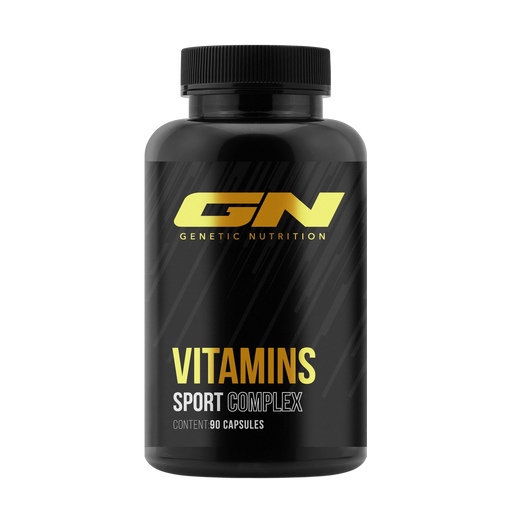 Save 11%
Save %
Original price €34,90Original price €34,90 - Original price €34,90Original price €34,90Current price €31,06€31,06 - €31,06Current price €31,06| /
Save 11%
Save %
Original price €34,90Original price €34,90 - Original price €34,90Original price €34,90Current price €31,06€31,06 - €31,06Current price €31,06| /Vitamins Sport Complex · 90 capsules
GN Laboratories75 reviewsThe "insurance policy" for every athlete and non-athlete, ensuring that no deficiency of any essential vitamin or mineral can affect your maximum p...
View full detailsOriginal price €34,90Original price €34,90 - Original price €34,90Original price €34,90Current price €31,06€31,06 - €31,06Current price €31,06| /Save 11% Save % -
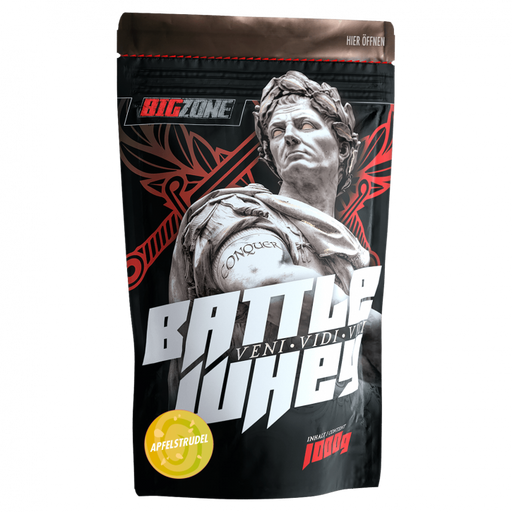 Save 0%
Save %
Original price €31,90 - Original price €31,90Original price €31,90€31,90€31,90 - €31,90Current price €31,90| /
Save 0%
Save %
Original price €31,90 - Original price €31,90Original price €31,90€31,90€31,90 - €31,90Current price €31,90| /Battle Whey · 1000g
Big Zone17 reviewsAddition of digestive enzymes Better digestibility Better absorption Suitable for lactose intolerant people Creamy consistency
Original price €31,90 - Original price €31,90Original price €31,90€31,90€31,90 - €31,90Current price €31,90| /Save 0% Save % -
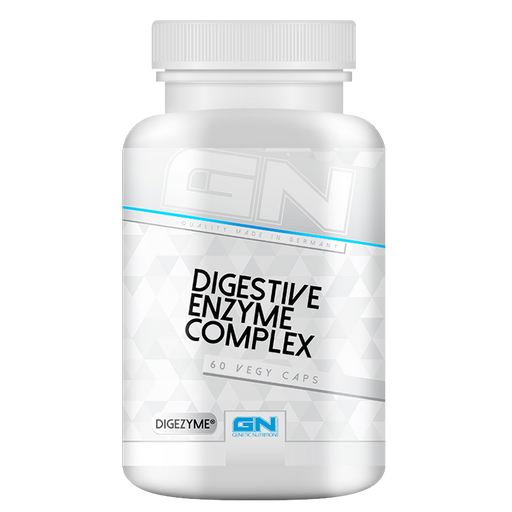 Save 11%
Save %
Original price €16,90Original price €16,90 - Original price €16,90Original price €16,90Current price €15,04€15,04 - €15,04Current price €15,04| /
Save 11%
Save %
Original price €16,90Original price €16,90 - Original price €16,90Original price €16,90Current price €15,04€15,04 - €15,04Current price €15,04| /Digestive Enzyme Complex · 60 capsules
GN Laboratories35 reviewsThe Digestive Enzyme Complex from GN is a highly concentrated and comprehensive mixture of digestive enzymes. These support digestion and can thus ...
View full detailsOriginal price €16,90Original price €16,90 - Original price €16,90Original price €16,90Current price €15,04€15,04 - €15,04Current price €15,04| /Save 11% Save % -
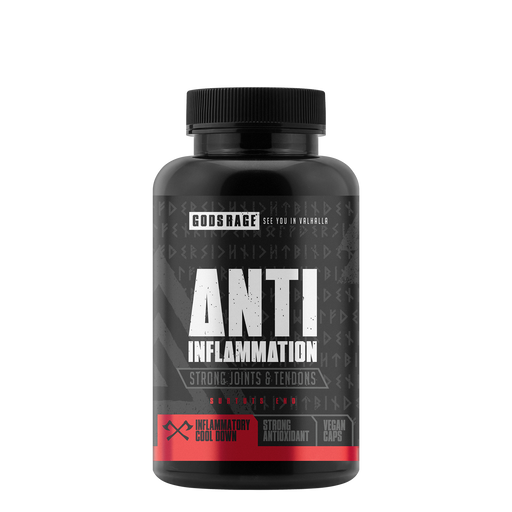 Save 11%
Save %
Original price €19,90Original price €19,90 - Original price €19,90Original price €19,90Current price €17,71€17,71 - €17,71Current price €17,71| /
Save 11%
Save %
Original price €19,90Original price €19,90 - Original price €19,90Original price €19,90Current price €17,71€17,71 - €17,71Current price €17,71| /Anti Inflammation · 60 capsules
Gods Rage31 reviewsAnyone who pushes their limits in the gym and trains hard is putting their body under great strain. Increased inflammation levels can hardly be avo...
View full detailsOriginal price €19,90Original price €19,90 - Original price €19,90Original price €19,90Current price €17,71€17,71 - €17,71Current price €17,71| /Save 11% Save % -
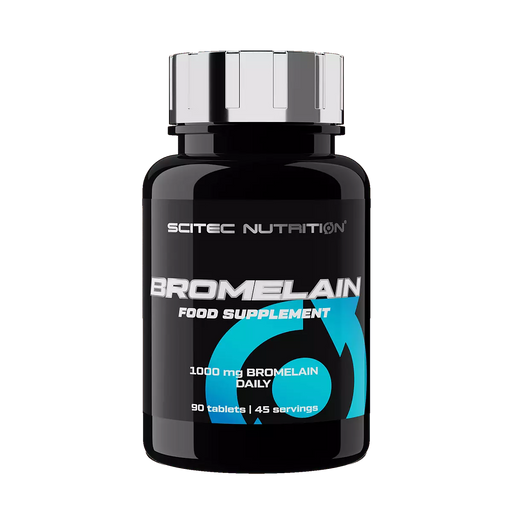 Save 11%
Save %
Original price €14,90Original price €14,90 - Original price €14,90Original price €14,90Current price €13,26€13,26 - €13,26Current price €13,26| /
Save 11%
Save %
Original price €14,90Original price €14,90 - Original price €14,90Original price €14,90Current price €13,26€13,26 - €13,26Current price €13,26| /Bromelain · 90 tablets
SCITEC NutritionNo reviewsBromelain - natural enzyme in pineapple Promotes digestion and protein breakdown Anti-inflammatory for muscle and joint pain Reduces swelling a...
View full detailsOriginal price €14,90Original price €14,90 - Original price €14,90Original price €14,90Current price €13,26€13,26 - €13,26Current price €13,26| /Save 11% Save %
Bromelain (Ananas comosus) was discovered in 1957 and is found in the fruit and stem of the pineapple tree (Ananas comosus). Bromelain is a group of proteolytic enzymes (and other compounds including a peroxidase enzyme, an acid phosphatase enzyme, several protease inhibitors and calcium) that are extracted from either the fruit or the stem of the pineapple (Ananas comosus). Accordingly, the physiological activities of bromelain are a result of multiple factors. Proteolytic enzymes, also known as proteases, are protein-digesting enzymes that break down proteins into amino acids (1, 2). Strain and fruit bromelain are produced differently and contain varying amounts of these enzymes. Bromelain, which is extracted from the stem of the plant, is more commonly used in studies as it has a higher protease content (1, 3). Bromelain is used, among other things, in the structural elucidation of proteins, it also serves as a meat tenderizer and is used in leather processing.
Enzymes and components
The composition of bromelain depends on the method of purification and the source of the annanase extract (3). Fruit bromelain is produced using chilled pressed annanase juice that undergoes ultrafiltration (5). Strain bromelain is produced by centrifuging, filtering, lyophilizing and freeze-drying pineapple strains (5). Bromelain is a mixture of different thiol endopeptidases, which are enzymes that break down proteins. It also contains other enzymes such as phosphatases, glucosidases, peroxidases, cellulases, escharases and various protease inhibitors. Protease inhibitors prevent protease enzymes from breaking down proteins (1). The anti-inflammatory and anticoagulant properties of bromelain are probably related to protease activity (protein-digesting activity). However, the tumor growth inhibiting and burn healing promoting effects are based on other mechanisms (1). Commercially available bromelain is evaluated based on its proteolytic activity and other health effects such as anti-inflammatory and tumor growth inhibitory properties (4).
Potential health benefits of bromelain
Bromelain has a variety of potential health benefits, which we will look at in the following sections in combination with the current scientific evidence.
Bromelain can support weight loss
Bromelain may support weight loss due to its effects on adipose tissue (6). In rat cell cultures, strain bromelain inhibits the formation (differentiation) of fat cells. It does this by increasing the amount of genes (C/EBPα and PPARγ) required for the formation of fat cells (6). In addition, it blocks Akt/mTor signaling and increases TNF-α levels in mature fat cells. This leads to self-destruction of the cells (6). In addition, TNF-α induces the breakdown of fats (lipolysis). All of these factors combine to help prevent and treat obesity (6).
Bromelain can promote the health of the cardiovascular system
Bromelain generally helps protect against cardiovascular disease. It is a natural blood thinner and has an anti-inflammatory effect. It helps to break down fibrin, a protein in the blood that can weaken good blood circulation, and it also protects tissue from dehydration. Platelet aggregation occurs when blood cells clump together. This causes the formation of blood clots and increases the risk of heart disease. Bromelain can relieve symptoms of thrombosis as it can inhibit platelet aggregation (1), and it breaks down atherosclerotic plaques (deposits on the walls of blood vessels). In one study, incubating different blood samples from 10 healthy volunteers with bromelain led to a significant reduction in platelet counts. Even after the scientists used drugs to induce platelet aggregation, the bromelain-treated blood samples showed lower platelet aggregation than control samples (27). Ischemic injury can occur in heart attacks and strokes. In rats, administration of bromelain protected the heart by limiting the development of ischemic injury. In rats, bromelain was able to reduce the death of heart cells and improve regeneration after a heart attack or stroke (28). Bromelain reduced the death of heart cells and increased the survival rate of heart cells. These effects may be due to activation of the Akt-FOXO pathway. Bromelain activates Akt and phosphorylates it, which in turn phosphorylates FOXO3A. Bromelain can reduce inflammation in phlebitis (inflammation of the veins) and stimulate the breakdown of fibrinogen (a factor in blood clotting) in angina pectoris.
Bromelain can strengthen the immune system
Bromelain can strengthen defense processes in the immune system and reduce inflammatory processes. It helps to dissolve foreign proteins (antigens), which are responsible for many allergic reactions. Combined with other proteolytic enzymes, bromelain can break down harmful immune complexes. Bromelain can strengthen cancer defense processes, for example by producing certain cytokines (interleukins and tumor necrosis factor), and it can help inhibit the spread of cancer cells. Bromelain activates the pro-inflammatory proteins IL-1β, IL-6, IFN-γ in the presence of cellular stress, but reduces the levels of these enzymes when the inflammatory response becomes too strong (3).
In mouse cell cultures, bromelain simultaneously inhibited and enhanced the T cell response. Under normal circumstances, bromelain increased the T cell response to help the immune system stay healthy. At the same time, bromelain inhibited IL-2 production in mice. These opposing effects are due to the different types of proteases contained in bromelain (7). However, when T cells are inappropriately activated during an autoimmune response or infectious disease, bromelain inhibits the activation of T cells. This helps fight autoimmune diseases (7).
Bromelain can inhibit cancer growth
Bromelain inhibits key pathways that are crucial for cancer growth. This includes the cell factor kappa B (NF-xB), cyclooxygenase-2 (COX-2), mitogen-activated protein kinases (MAPKs), Akt, and prostaglandin E2 (PGE-2) pathways (9). PGE-2 is a pro-inflammatory lipid. PGE-2 suppresses the function of the immune system and promotes tumor growth. Bromelain reduced PGE-2 levels in cell cultures of mouse cells and human cells (3). In mouse cell cultures, bromelain also inhibited ERK-2 transmission. This blocked the Ras and MAPK pathways, which helped to terminate inflammation and tumor growth (8). The overproduction of NF-kB also promotes cancer progression. Bromelain treatment in mice and mouse tissue inhibited the MAPK and Akt/PKB pathways and thereby also NF-kB. In addition, bromelain also inhibited NF-kB via inhibition of the cell growth cycle in human cancer cells (9,3).
Cancer cells and immune cells involved in cancer growth produce the CG44 cell marker. Bromelain reduces cellular CD44 production at the surface of tumor cells in humans and mice (39). In another study, bromelain treatment reduced tumor formation, tumor volume in mouse skin tumors and induced cancer cell death (10). Treatment with bromelain reduced the ability of human brain tumor cells to spread and invade other cells. Bromelain did not damage neighboring non-cancerous cells (11). Some tumor cells surround themselves with platelets to prevent them from being recognized by the cells of the immune system. Oral administration of bromelain reduced the number of platelets in humans. Inhibiting platelet activity can expose cancer cells, making them recognizable to the immune system (12, 3).
Bromelain can help in the treatment of arthritis
The anti-inflammatory activities of bromelain help in the treatment of rheumatoid arthritis due to its ability to reduce the production of TGF-β - a factor that contributes to inflammation in people with autoimmune diseases (3). A review of 10 studies concluded that bromelain had significant beneficial effects in patients with osteoarthritis of the knee. It reduced swelling, pain and stiffness of the joints (13). In a randomized, controlled, double-blind study of 103 patients, a combination of rutoside, trypsin and bromelain helped in the treatment of osteoarthritis of the knee. Patients rated this combination as being as effective as the painkiller diclofenac when it came to pain relief. In addition, this combination was safer and better tolerated than other arthritis medications (14). Although there is ample evidence of the potential of bromelain to treat different types of arthritis, further studies are needed. Scientists still need to find the optimal dosage and investigate the efficacy of long-term use (13).
Bromelain can be used to treat allergy symptoms
The anti-inflammatory activities of bromelain may help in the treatment of allergies and sinus problems. In a study of 50 subjects suffering from acute sinus problems, the bromelain group experienced greater symptom relief compared to the placebo group. The bromelain group had less inflammation in the nose and suffered fewer breathing problems (15). In another study, stem bromelain was effective in treating 62 children with acute sinusitis. In comparison, children treated with antibiotics or combination therapy recovered more slowly than those in the bromelain group (16). Bromelain also helped in the treatment of respiratory allergic diseases in the mouse model. These results suggest that bromelain may be helpful in the treatment of allergies, asthma and hypersensitivity disorders in humans (17).
Bromelain reduces pain and swelling
Bromelain is effective in reducing pain in otherwise healthy patients. In addition to treating arthritis, annanase extract can help treat post-workout muscle soreness, mild pain and post-surgery pain. Muscle pain and soreness are common after exercise. In a study of 20 healthy male participants, protease supplementation (containing bromelain and other enzymes) helped relieve muscle soreness after a downhill run (18). Better recovery was also observed in the protease group compared to the placebo group. The protease supplementation helped the volunteers' muscles to heal faster. This enabled a faster recovery of muscle function after intensive training. These effects are presumably based on the anti-inflammatory effect of bromelain and other protease enzymes (18). However, in a study of 39 subjects, bromelain supplementation alone had no effect on elbow pain and muscle dysfunction after exercise. This could be due to low bromelain dosage, lack of a control group and insufficient statistics (19).
In another study, one month of bromelain supplementation helped reduce pain and stiffness in 77 subjects with mild knee pain. Both 200 and 400 mg doses of bromelain were effective in improving physical function in otherwise healthy subjects (20).
However, this study did not have a control group to compare the results. In addition, it was not a double-blind study, which means that the researchers may have been biased, which could have skewed the results (20).
Bromelain also helps reduce pain and swelling after dental surgery. In one study, bromelain was effective in reducing pain and swelling in 28 out of 40 patients. Since there was no control group, the results of this study may be inconclusive (21).
Bromelain can reduce inflammation in the musculoskeletal system
Bromelain can help reduce inflammatory processes in tissues, joints and bones. It can also help to relieve pain and promote healing processes in wounds. In the case of gout, bromelain can help to relieve swelling and pain in the joints. Bromelain reduces the majority of pro-inflammatory mediators and is an effective anti-inflammatory agent (3).
Cyclooxygenase-2 (COX-2) is a primary factor contributing to inflammation. It helps to synthesize prostaglandin E2 (PGE-2), which is a pro-inflammatory lipid. PGE-E2 also suppresses the immune system and promotes tumor progression (3). Bromelain reduces COX-2 and PGE-2 levels in cell cultures of mouse and human cells (3). When inflammation causes the overproduction of pro-inflammatory cytokines, bromelain reduces the release of IL-1β, IL-6 and TNF-α. For example, bromelain reduces IFN-γ and TNF-α production in irritable bowel disease (3). Bromelain also reduces TGF-β production - another primary factor contributing to inflammation (3). In mouse cell cultures, the proteases in bromelain inhibit ERK-2 transmission. This inhibition blocks the production of cytokines and helps prevent inflammation (8).
Bromelain can support the function of the digestive system
Bromelain generally promotes the digestion of proteins from food. It can promote the absorption of some phytochemicals, such as curcumin and quercetin. Bromelain also inhibits the formation of inflammatory prostaglandins. Bromelain can relieve heartburn, it contributes to the healing of stomach ulcers and can prevent the emptying of important enzymes if pancreatic functions are inadequate. It can also promote the action of digestive enzymes such as trypsin or pepsin. The anti-inflammatory effects of bromelain have a positive effect on the digestive tract. For this reason, bromelain can help to reduce the symptoms of various digestive tract disorders. In intestinal cell cultures of rabbits, bromelain stopped the activity of various diarrhea-causing bacteria and toxins. Bromelain stops fluid secretion in the intestine, which could make it useful as an anti-diarrheal agent (22). In mice, administration of bromelain inhibited intestinal spasms. These effects were stronger in mice with diabetes and inflammation than in healthy mice. Therefore, bromelain could be a good treatment for digestive tract disorders (23). In a mouse model of inflammatory bowel disease, bromelain helped reduce symptoms of the disease. It also reduced CD44 production in mice, which helped to reduce intestinal inflammation (24). Cell cultures from the intestines of patients with inflammatory bowel disease show high levels of pro-inflammatory cytokines. Bromelain administration into these cells inhibits cytokine production. This could lead to reduced inflammation in patients with inflammatory bowel disease (25). Unfortunately, there are currently no clinical studies on the effects of bromelain on inflammatory bowel disease in human subjects. However, there are two case studies in which bromelain helped to reduce the symptoms of colitis (26).
Bromelain can help heal the skin
When applied as a cream, bromelain can help remove damaged skin cells from wounds or burns. Bromelain contains escharase, which helps to remove dead tissue and accelerate healing (1, 29). Pityriasis Lichenoides Chronica (PLC) is a skin disease with unknown causes. Eight PLC patients supplemented with bromelain for months. Bromelain supplementation was effective in treating all patients, all of whom made a full recovery (30). Even though two patients relapsed five or six months after the end of therapy, a short course of therapy was able to stop the PLC symptoms again (30). Since the causes of PLC are unknown, scientists are unsure of the mechanisms behind bromelain's ability to treat this disease. The protein-digesting, anti-inflammatory and antiviral effects attributed to this extract are possible explanations (30).
Bromelain can potentially reduce the risk of Alzheimer's disease
Beta-amyloid plaques are believed to be the primary factor contributing to the development of Alzheimer's disease. A proteinase complex containing trypsin, alpha-chymotrypsin, and bromelain helps break down beta-amyloid (31). An analysis of human blood samples showed that oral administration of these proteinases reduced beta-amyloid levels in healthy volunteers. This increase in beta-amyloid degradation could help to reduce the risk of developing Alzheimer's disease (31).
Infections in the urinary tract
Bromelain may improve treatment as it can enhance the effectiveness of antibiotics.
What should be considered when taking bromelain?
Bromelain is available individually in the form of capsules, tablets and powders, but usually in combination with other proteolytic enzymes. It is also considered safe to take in higher doses. The dosage of bromelain and the coordination with other medications should be based on therapeutic recommendation. For most applications, the recommended doses range from 750 mg to 1000 mg bromelain daily; the dosage may be lower in some cases and higher in others. The intake of bromelain is usually divided into four applications per day. Bromelain is absorbed when taken orally; the highest concentrations are detectable in the blood one hour after ingestion, after which the activity decreases. When taking enzymes, care should generally be taken to ensure that they support digestion directly with meals (shortly before, during and immediately after). If they are taken approx. 1 ½ to 2 hours before or after a meal, the optimum anti-inflammatory effect is achieved.
Precautions and side effects
Bromelain is potentially safe and harmless for most people when taken in appropriate doses. However, bromelain may cause some side effects such as diarrhea and stomach upset. In addition, bromelain can cause allergic reactions, especially for people who suffer from other allergies. For this reason, you should consult your doctor before taking bromelain if you suffer from allergies.
Precautions & Warnings
Pregnancy and breastfeeding: Not enough is known about the safety of bromelain during pregnancy and breastfeeding. For this reason, pregnant and breastfeeding women should avoid bromelain to be on the safe side. Some common side effects include diarrhea, nausea, bloating, headaches, fatigue and skin rashes (13). People who are allergic to pineapple should avoid bromelain supplements. Bromelain can cause allergic reactions in some people (32). If you are allergic to latex, wheat, celery, papain, carrots, fennel, cypress pollen or grass pollen, then you could also be allergic to bromelain. Surgeries: Bromelain could increase the risk of bleeding during and after operations. For this reason, you should stop taking bromelain 2 weeks before planned operations.
Interactions
Bromelain can increase the availability of certain medications in the body, as well as reduce the side effects associated with different medications (33, 4). Care should be taken when combining bromelain with the following medications:
Antibiotics (tetracycline antibiotics)
Bromelain may increase the amount of tetracycline antibiotics absorbed by the body (34, 6). Taking bromelain in combination with some antibiotics could increase the effects and side effects of tetracycline antibiotics.
Drugs that slow down blood clotting
Bromelain could slow down blood clotting. Taking bromelain in combination with medications that also slow blood clotting could increase the risk of bleeding and the tendency to bruise. Some medications that can slow blood clotting include aspirin, diclofenac (Voltaren), ibuprofen, naproxen and others. Bromelain increases the uptake and absorption of heparin in the digestive tract of rats. Heparin is a blood thinner that can prevent the formation of blood clots. People who use heparin and bromelain at the same time should be careful, as this combination could increase the risk of bleeding (34). Bromelain thins the blood, so it should not be used in combination with other blood-thinning medications such as warfarin (35). Care should also be taken when using other supplements such as fish oil, which also thin the blood. Curcumin has a low absorption rate. Therefore, curcumin and bromelain are often used together to increase the absorption and anti-inflammatory effects of both supplements (37). Bromelain is also used to increase the absorption of quercetin - a flavonoid with many health benefits.
Bromelain also increases the absorption of
- penicillin (4)
- Fluorescein (39)
- Glutathione (39)
Dosage
Bromelain is used in the form of food supplements, powder or cream. The recommended dosage is around 750 mg per day (4). Bromelain should be taken at least one hour before meals (4). It is important to note that pineapple does not provide the same health benefits as bromelain supplementation. In human osteoarthritis studies, researchers used dosages of bromelain that ranged from 540 to 1890 mg per day. At lower doses, bromelain is safe and well tolerated (13). In studies using higher doses, there were conflicting results; in one study, 1890 mg was well tolerated, while another study using 945 mg reported more side effects (13).
For this reason, further studies are needed to assess safety and tolerability.
Note on intake
For good absorption and maximum anti-inflammatory effects, bromelain should be taken on an empty stomach at intervals between meals. However, this may cause digestive discomfort in some people.
References
- https://www.ncbi.nlm.nih.gov/pmc/articles/PMC3529416/
- https://www.ncbi.nlm.nih.gov/pmc/articles/PMC2576539/
- https://www.ncbi.nlm.nih.gov/pmc/articles/PMC4998156/
- https://www.ncbi.nlm.nih.gov/pubmed/11577981/
- https://dx.doi.org/10.1590/1678-4324-2016150010
- https://www.ncbi.nlm.nih.gov/pmc/articles/PMC3265525/
- https://www.ncbi.nlm.nih.gov/pubmed/11485354/
- http://www.jimmunol.org/content/163/5/2568.long
- https://www.ncbi.nlm.nih.gov/pubmed/19339108/
- https://www.ncbi.nlm.nih.gov/pubmed/17893836/
- https://www.ncbi.nlm.nih.gov/pmc/articles/PMC1506565/
- https://www.ncbi.nlm.nih.gov/pubmed/16308185/
- https://www.ncbi.nlm.nih.gov/pmc/articles/PMC538506/
- https://www.ncbi.nlm.nih.gov/pubmed/15278753/
- http://onlinelibrary.wiley.com/doi/10.1111/j.1526-4610.1967.hed0701013.x/abstract
- https://www.ncbi.nlm.nih.gov/pubmed/15796206
- https://www.ncbi.nlm.nih.gov/pmc/articles/PMC2576519/
- https://www.ncbi.nlm.nih.gov/pubmed/15161110
- https://www.ncbi.nlm.nih.gov/pubmed/12466693
- https://www.ncbi.nlm.nih.gov/pubmed/12587686
- https://www.ncbi.nlm.nih.gov/pmc/articles/PMC5285595/
- https://www.ncbi.nlm.nih.gov/pubmed/9207276/
- https://www.ncbi.nlm.nih.gov/pubmed/21689210
- https://www.ncbi.nlm.nih.gov/pubmed/15936249
- https://www.ncbi.nlm.nih.gov/pmc/articles/PMC2269703/
- https://www.ncbi.nlm.nih.gov/pubmed/10766699/
- https://www.ncbi.nlm.nih.gov/pubmed/16308185
- https://www.ncbi.nlm.nih.gov/pmc/articles/PMC2581828/
- https://www.ncbi.nlm.nih.gov/pubmed/6352539/
- https://www.ncbi.nlm.nih.gov/pubmed/17671882
- https://www.ncbi.nlm.nih.gov/pubmed/11161627
- https://www.ncbi.nlm.nih.gov/pubmed/498486
- https://www.ncbi.nlm.nih.gov/pubmed/3287010/
- https://www.ncbi.nlm.nih.gov/pubmed/16950580
- https://www.ncbi.nlm.nih.gov/pubmed/10902065
- https://www.ncbi.nlm.nih.gov/pmc/articles/PMC1429694/
- https://www.ncbi.nlm.nih.gov/pmc/articles/PMC3633300/
- http://www.akspublication.com/paper05_jul-dec2007.htm
- https://www.ncbi.nlm.nih.gov/pubmed/15607266
Further reading
- Inoue K, Motonaga A, Dainaka J, et al. Effect of etodolac on prostaglandin E2 biosynthesis, active oxygen generation and bradykinin formation. Prostaglandins Leukot Essent Fatty Acids 1994;51:457-462.
- Seligman B. Bromelain: an anti-inflammatory agent. Angiology 1962;13:508-10.
- Cirelli MG. Treatment of inflammation and edema with bromelain. Delaware Med J 1962;34:159-67.
- Seltzer AP. Minimizing post-operative edema and ecchymoses by the use of an oral enzyme preparation (bromelain). EENT Monthly 1962;41:813-7.
- Gerard G. Anti-cancer therapy with bromelain. Agress 1972;3:261-274.
- Nieper HA. A program for the treatment of cancer. Cancer 1974;6:124-127.
- Balakrishnan V, Hareendran A, Nair CS. Double-blind cross-over trial of an enzyme preparation in pancreatic steatorrhea. J Assoc Physicians India 1981;29:207-9.
- Cohen A, Goldman J. Bromelain therapy in rheumatoid arthritis. Pennsylvania Med J 1964;67:27-30.
- Munzig E, Eckert K, Harrach T, et al. Bromelain protease F9 reduces the CD44 mediated adhesions of human peripheral blood lymphocytes to human umbilical vein endothelial cells. FEBS Lett 1995;351:215-8.
- Engwerda CR, Andrew D, Murphy M, Mynott TL. "Bromelain activates murine macrophages and natural killer cells in vitro." Cell Immunol. 2001 May 25;210(1):5-10.
- MacKay D, Miller AL. Nutritional support for wound healing. Altern Med Rev. 2003 Nov;8(4):359-77.
- Tinozzi S, Venegoni A. Effect of bromelain on serum and tissue levels of amoxycillin. Drugs Expt Clin Res 1978;4:39-44.
- Luerti M, Vignali ML. Influence of bromelain on penetration of antibiotics in uterus, salpinx and ovary. Drugs Expt Clin Res 1978;4:45-48.
- Renzinni G, Varengo M. The absorption of tetracycline in combination with bromelain by oral application. Arzneim-Forsch 1972;22:410-412.
- Nieper HA. Effect of bromelain on coronary heart disease and angina pectoris. Acta Med Empirica 1978;5:274-278.
- Ryan RE. A double-blind clinical evaluation of bromelains in the treatment of acute sinusitis. Headache 1967;7:13-17.
- Schafer A, Adelman B. Plasma inhibition of platelet function and of arachidonic acid metabolism J Clin Invest 1985;75:456-61.
- Eckert K, Grabowska E, Stange R, Schneider U, Eschmann K, Maurer HR. "Effects of oral bromelain administration on the impaired immunocytotoxicity of mononuclear cells from mammary tumor patients." Oncol Rep. 1999 Nov-Dec;6(6):1191-9.





